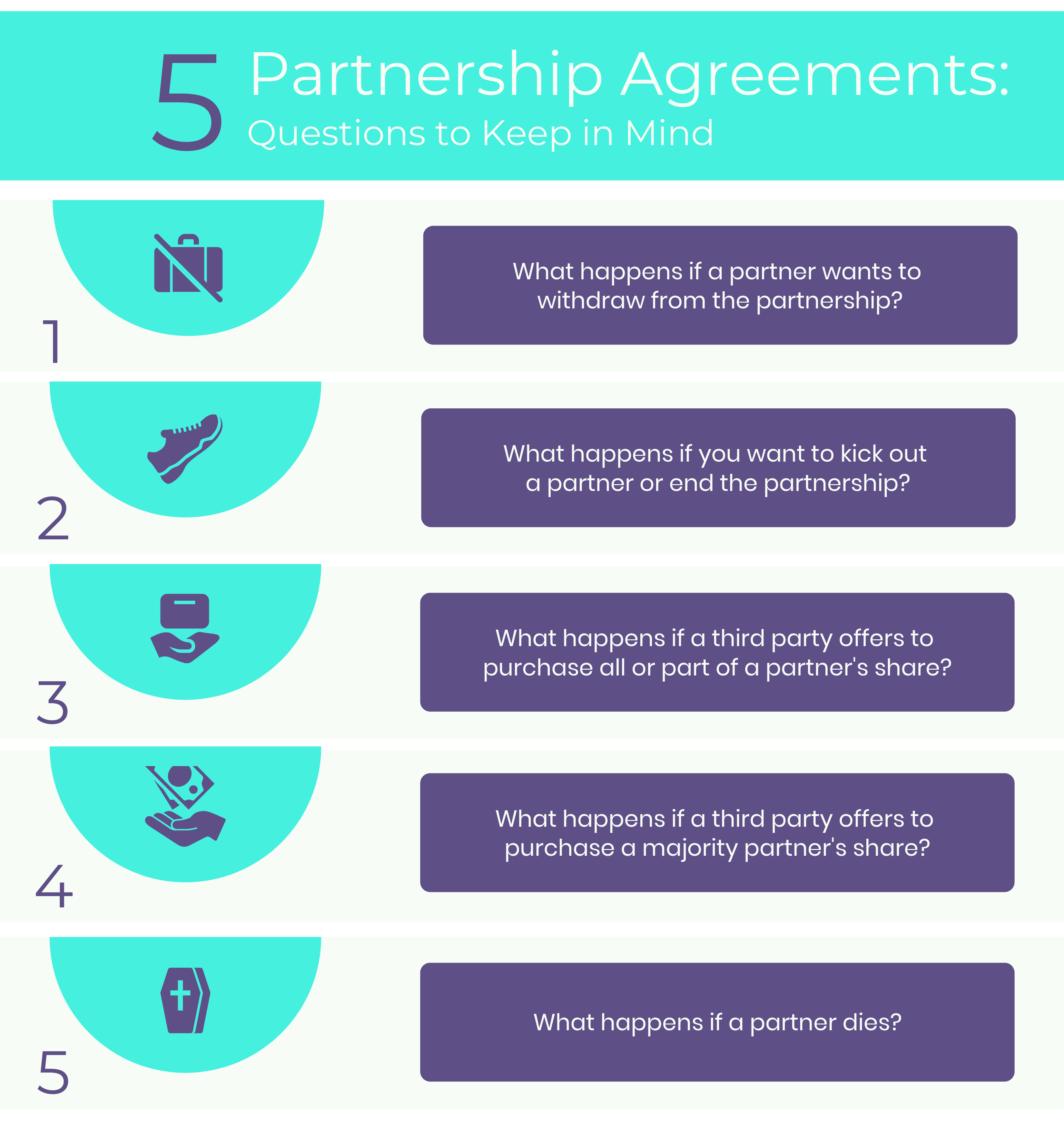Partnership Agreements in Quebec: 5 Questions to Keep in Mind
General Partnerships and Limited Partnerships are the legal structures that are the most often used by businesses in Quebec. This mainly is due the fact that partnerships have a cheaper start-up cost and are easier to operate. However, starting a Partnership in Quebec comes with one main downfall: all partnerships must necessarily have a partnership agreement to operate.
The partnership agreement that is signed between all the partners of the business will contain several clauses related to governance, contributions, distributions, disputes, death, disability and dissolution. More importantly, the partnership agreement will establish the terms of the relationship between the partners. Like any other relationship, the partners need to know how to handle certain situations if they arise, for instance:
- What happens if a partner wants to withdraw from the partnership?
- What happens if you want to kick out a partner or end the partnership?
- What happens if a third party offers to purchase all or a part of a partner’s share?
- What happens if a third party offers to purchase a majority partner’s share?
- What happens if a partner dies?
Partnership agreements are most valuable when certain problematic situations arise in a business. By signing a partnership agreement at the start of the partnership, the partners will establish a set of rules and guidelines to handle these situations and to avoid the additional headache associated therewith. These are some of the questions partners should keep in mind when negotiating their partnership agreement.
- What happens if a partner wants to withdraw from the partnership?
A. Right of First Refusal
A well drafted Partnership Agreement should clearly indicate what will happen should a partner want to sell their share in the partnership. Typically, the partnership agreement will include a “right of first refusal clause” which will allow the other partners to purchase the share of the selling partner before the share is offered to a third party.
In this case, the partner who wishes to sell their share in the partnership will provide notice to the other partners who will then have the first chance to either purchase or refuse the share. In most cases, the clause will set out how the notice to the partners will be given and how long the partners have to respond – typically it is within a 30-day delay.
Additionally, the right of first refusal clause should address what will happen if all the partners or more than one partner offers to purchase the share. In this case, the selling partner will most likely have to sell their share on a pro-rata basis, based on the proportionate shareholding of each partner.
This clause is particularly important when dealing with small businesses who have very few partners. In this case, it allows the partners to prevent from having an undesirable third party join the partnership without their consent – or even more so having an undesirable third party obtain controlling interest in the partnership.
B. Outside Offer
In the event that the remaining partners refuse to accept the offer to purchase, the selling partner can then assign his interest in the Partnership to a third party according to the terms of payment that the selling Partner negotiates with the third party.
In the event where the selling partner agrees to sell his share in the partnership to a third party for a lower price than the price indicated in the partnership agreement, the selling partner will have to provide notice to the other partners, who will then have the chance to purchase the selling partner’s share in the business for the same price and on the same terms as negotiated with the third party.
C. Non-Competition and Non-Solicitation Clause
If a partner plans on leaving the partnership and was privy to certain confidential proprietary information, it is useful for the partners to include a non-competition and non-solicitation clause in the partnership agreement.
The non-competition clause can prevent the selling partner from directly competing with the business for a certain period of time after leaving the business. On the other hand, the non-solicitation clause can prohibit the selling partner from soliciting other partners, employees, or clients of the partnership to leave the business for another.
2. What happens if you want to kick out a partner or end the partnership?
The Partnership agreement should clearly stipulate what will happen should a partner want to kick out a fellow partner and/or end the partnership. In this case, a “shotgun” clause is typically added into the partnership agreement as a form of dispute resolution.
The shotgun clause is used to either force a partner to buy or sell their share in the partnership at the same price. In the event this clause is triggered, the target partner will have the option of either buying out their partner or selling their share to the other partner. Typically, the clause will set out the procedure to notify the target partner of the ignition of the shot gun clause along with how long he will have to respond – typically within a 30-day delay.
3. What happens if a third party offers to purchase all or a part of a partner’s share?
In some cases, a partner may receive an outside offer from a third party to purchase all or a part of their interests in the partnership. If this happens, the solicited partner who wishes to accept the offer will have to send a first notice to the other partners in the partnership indicating the price offered to the solicited partner along with the terms and conditions of the sale.
Once notified, the remaining partners in the partnerships will be entitled to purchase all or part of the Partner’s interests that is subject of the outside offer. Typically, the remaining partners in the partnership will have a 30-day delay to respond to the solicited partner indicating if they accept or refuse to purchase the solicited partner’s share in the partnership.
4. What happens if a third party offers to purchase a majority partner’s share?
In some cases, a third party will present an outside offer to all the partners of a partnership to purchase the entirety of the partnership. If this case arises and a majority partner wishes to accept the outside offer, the majority partner will typically have to notify the minority partners of his desire to proceed with the sale of his share in the partnership.
After receiving such notice, the minority partners will have the option to either (a) sell their share in the partnership to the third party who presented the outside offer at the same price, terms and conditions as the offer made to the majority partner or, (b) refuse to sell their share in the partnership to the third party who presented the outside offer but agree to purchase with any other minority partner the share of the majority partner according to the price, terms and conditions of the outside offer.
This clause is very similar to a common “tag-along” clause that is seen in shareholders’ agreements. It is particularly useful to protect minority partners in the event of a third-party buy-out. For instance, if a minority partner only owns 10% interest in the partnership, it would be particularly difficult for them to sell their interests at a later date. Thus, the clause will force them to either sell their interests to a third party or buy the interests of the majority partner in order to prevent from finding themselves with unsalable or devalued interests after the sale.
5. What happens if a partner dies?
Finally, one of the most important clauses in a partnership is the death clause. New partners entering in a partnership should always think about what will happen should a partner die. According to Quebec devolution laws, when a partner dies, his share in the partnership will go to his estate. Thus, the estate will become the other partner in the partnership, which can lead to a potentially undesirable result.
In order to counter this, partners can include a clause in their partnership agreement that states that upon death of a partner, the entire share of the deceased partner will be sold to the surviving partners who will have the obligation to purchase the entire share at a price that is already pre-determined in the partnership agreement.
To conclude, it is pivotal for partners in a partnership to ensure that these questions are properly answered inside their partnership agreement. Providing for the correct exit strategy or correct procedure to deal with certain issues at the beginning of the relationship can create great ease between the partners should a potentially unpleasant situation occur.
For more information on partnership agreements, please visit our partnership agreement page or contact us here for more details.

